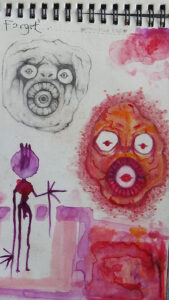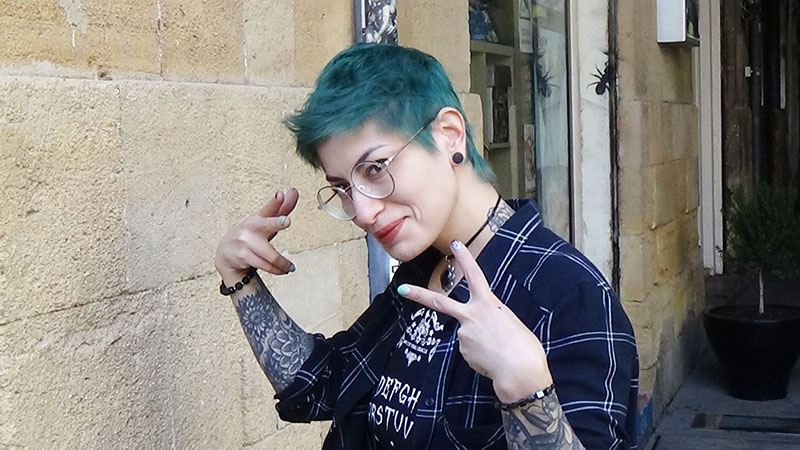In a lifelong geek that runs a comic store, THEO PANAYIDES meets a woman drawn to extremes whose habit of drawing every day helps to embrace what scares her
Talking to Ivy Payiatsou – Ivy Yasmin Payiatsou Villalvazo, to give her full name – is an entertainment in itself. It makes no difference what we talk about, whether it’s comic books or Halloween or her own addictive personality (or darker stuff, like being a survivor of an abusive relationship), it becomes a whole production. She strikes poses, does funny voices; she’s hyperactive. Her hair is green, her tongue pierced, her arms a tattooed jungle of flowers, birds and snakes. “I have fun with horror,” she says, and waggles her eyebrows like a geek-Goth Groucho.
We talk a few days before Halloween, incidentally plugging the Halloween event at Ant Comics – the comic-book shop in old Nicosia which she’s managed since 2019, having previously worked, shopped and practically lived there for over a decade – but in fact the conversation veers all over the place. It almost doesn’t happen at all, a last-minute text informing me that she’s going to be late due to “a small emergency with my hell hounds”. (She has two, both originally found on the street bearing marks of abuse.) Apparently the dogs – or one dog, who knows? “they both look very guilty” – “pooped all over my grandma’s living room”, and it took half an hour to clean it up. Ivy lives with Grandma, who’s 92 and practically raised her after her parents’ divorce. ‘Wow, 92!’ I begin – but she cuts me off, putting a hand to her forehead: “She’s 92 years old and she’s brutal, she’s brutal. Don’t, don’t, don’t, she’s very brutal”.
Grandma (presumably not the real grandma, but a comical cartoon version of Grandma) is one of the voices that pop up at intervals, a querulous old-lady treble out of Monty Python. She peers over Ivy’s shoulder at her sketchbook – Ivy tries to draw every day, having studied Contemporary Art Practice at Gray’s School of Art in Aberdeen – and makes brutally honest comments (“What’s this nonsense? Why is her nose like that?”). Ivy’s whole family are apparently characters, at least in her telling (her boyfriend Umut would appear to be a steadying influence): her Mexican mother is a tall, elegant Latina, a “cool summer breeze” sort of woman; her Cypriot dad is “a little Gimli” – meaning tubby, short and jolly, for those unfamiliar with Lord of the Rings – a now-retired taxi driver and lifelong geek, like his daughter. Did they really divorce after just a few years? “Yeah, are you crazy? My mum and my dad? Woof!”
That’s too bad. I thought this was going to be a romantic story about love being blind and opposites attracting and so forth.
“No, Jesus Christ no. No! Love ends! Love ain’t nice!”
We should probably make a couple of things clear here. First, despite the trash talk, Ivy seems devoted to her family, including her late beekeeper grandpa and the cousins in Mexico, who are all geeks like her. (Manga and anime are huge in Mexico.) Second, despite her show of cynicism, she’s an obvious softy, rescuing dogs – half her Facebook seems to be about finding homes for strays – and proudly affirming Ant Comics as a place where confused or unhappy people can find refuge: “Here we have fun. Here we talk. Here we’re civil. If you need help, you can reach out”.
She herself was confused and unhappy at first, what with the divorce and being quote-unquote “weird” in general. She was bookish at 12, an awkward introvert who took her books along on school trips (Frankenstein and The Picture of Dorian Gray were her favourites) to read on the bus. One day, at a kiosk in Ayia Napa, she found a Catwoman comic book – she’s still unsure of the title – and pestered her mum to buy it for her. Ivy remembers the plot very vividly (it was the first comic book she ever became obsessed with): Catwoman was battling a villainess who owned a cosmetics company and did her evil testing on cats. Our heroine breaks into the lab, frees all the kittens, then kidnaps the woman and seems about to exact feline revenge on her – but Batman intervenes, and stops her from crossing the line. (When did Batman become so high-and-mighty? “He was always like this,” she snaps. “He’s a rich boy with untreated PTSD.”) The end panel shows Catwoman alone, her vigour suppressed by the patriarchy – yet surrounded by all the kittens she’s saved, finding succour among her own kind.
Glib and simplistic are bad things – but it’s possible, at least, to see a glimpse of her own personality in this scenario, forever on the brink of being ‘too much’ and struggling to control her own destiny. At five, she rebelled against the piano and ballet lessons foisted upon her by well-meaning parents. Later, in her teens (she’s now 30), she found herself in a toxic relationship – “my first relationship, so I was blind as a bat”. It actually lasted six years, starting out well enough and growing increasingly darker. “At the time you’re like ‘My partner shouldn’t treat me like this’. It doesn’t make sense in your brain.” Her self-esteem plummeted; she hated herself, taking comfort in food. Her weight ballooned to 95 kilos. The abuse was mostly emotional – she can talk about this now, after years of therapy – “a lot of manipulation… But very controlling, very controlling. I no like.” Her mood changes suddenly, another pose and a carnival barker’s voice: “And therapy helps, people! Therapy helps! People should go to therapy”.
Her tone is jocular, but the darkness was real. She vividly recalls feeling trapped – especially as a vulnerable girl who’d never had much of a social support system – and unsure what to do, unsure how (or even whether) to escape. In the end, she kicked the guy out. “What is this man doing?” she asked herself, taking a long hard look at the relationship: “He’s supporting me [in trying to lose weight] but then he’s buying cakes, ‘Are you sure you don’t want a piece of cake?’ – because that’s another way to control. Dum dum dummmm!”. The villain is unmasked, the penny drops; “Something clicked and I was like ‘I don’t want you in my life’.” It sounds simple, but of course it never is – and the scars run deep, even now.
She still gets triggered by TV shows, especially rape scenes but even harassment – “even a woman harassing a man”, played for comedy in Norsemen on Netflix, made her totally lose it. Years into therapy, around the time when she was starting to date Umut, “I was in a bar, I was drinking water and someone – I don’t remember what was said by this very ignorant man” (it was something about women being weak, and deserving all they get) – “I remember I just put the glass down and I’m shaking, and I’m like ‘I’m not OK’. And I remember just screaming, I’m crying and I’m screaming in this bar, and everybody just froze, and I’m trying to open the door – and it’s like ‘I can’t open the door!’. I just pushed it and I ran into the street, I just found a little corner and I could not stop crying.”
Ivy’s body language shifts abruptly, another pose. “Isn’t it fun?” she trills into the silence. She slumps, serious again: “It’s horrible. But I realise that you never forget”.

There’s a posh British voice, talking of the private kindergarten she once attended: “It was veddy fancy”. There’s a squeaky ethereal voice, representing 16-year-old Ivy when she first passed by Ant Comics: “I was like ‘What is this shop? Hmmm, I see liiiights’”. (At the time she was madly into vampires, though definitely not Bella and Edward: “Do not talk about Twilight, I hated Twilight!… Can we talk about Bela Lugosi [the original Dracula in the 1931 film], he was a beautiful man.”) There’s a dopey voice, like a deep-throated chicken, representing some random guy who complained to her that “‘Oh, comic books now, it’s full of SJWs’. I’m like ‘Bruh! Is this the first time you’ve picked up a comic book? Comic books were always political!’ They were always political, from the get-go. Pick up X-Men, we’re talking about mutants” – Ivy inclines her head, giving me a conspiratorial look from behind her round glasses: “Are we really talking about mutants?”.

It’s not just narrow politics, though; our whole society could use a tune-up. Ivy seems to have a love-hate relationship with Cyprus, jokingly (or half-jokingly) wondering what possessed her mother to come here on holiday in the first place. (A Cypriot friend in Mexico recommended it: “Mum was like ‘Omigod, it sounds like an ideal, very nice place’, and I’m like [evil gremlin voice] ‘You have been LIED to!’.”) One thing she discovered after her own bad experience was just how common toxic relationships are: she recalls sitting at a bar with three other girls, and they got to talking – and four out of four had a story to tell, of being hurt and made to feel worthless. Above all, she says – and this is what must chafe most unbearably against her own fervent need for self-expression – nobody talks, “because we are afraid of opening up, goddammit!”.
Emotional repression doesn’t sit well with Ivy Payiatsou, whether in a bad relationship or later, in talking about it (and talking in general; she’s done loads of podcasts with other stalwarts of the geek community). She’s not – let’s be clear – a man-hater, indeed the taboos are probably worse for men: “You have that stupid toxic masculinity just building up,” she sighs, “and I’m like ‘Dude, it’s okay to cry’. And they break down”. It’s even worse for LGBT folk, “they’re suffering a lot”, and bad for young people too, who find no obvious outlet for their feelings. “There’s a lot of – woo-hoo-hoo,” she says, meaning roughly ‘pain and mayhem’, “there’s a lot of built-up stuff, I can see it, that it’s a volcano ready to burst. And it sucks. Because I’ve seen that volcano bursting within me, and I don’t want someone to have to go through that.”
There’s a lot more she could mention, I presume; one can sense the secret history in the raw, furious pieces on her Tumblr page, and the ominous talk of a ‘volcano bursting within me’. Ivy is a person of extremes, she says so herself (so does her stepmother, who happens to be a psychologist): “It’s like ‘Go big or go home’”. She recalls buying flowers for her grandparents’ graves in Mexico – she loves flowers – and staggering into the cemetery with an unfeasibly huge bouquet of flowers; she has a tendency to overdo things. She seems like an addictive personality in general, I note; has she ever had problems with addiction? “Yes,” she replies without elaborating. “And that’s okay… That’s why I’m always keeping myself in check, as well. With everything.”
In the end, we don’t really talk very much about Halloween – but perhaps we do, since Halloween is about embracing what scares you (ghouls and monsters standing in for hurts and phobias) and that’s also what Ivy’s learned to do, one day at a time. “I can’t change the past,” she shrugs. “I embrace it, it is what it is – and I try to be a better version of myself every single day, like everyone does. Well, I assume they do,” she adds, shape-shifting once again, Ivy the Virtuous into Ivy the Avenger: “I want to believe that it’s ‘everyone’. Because some people… boy oh boy, do they piss me off!”. And she seemed like such a calm girl.








Click here to change your cookie preferences